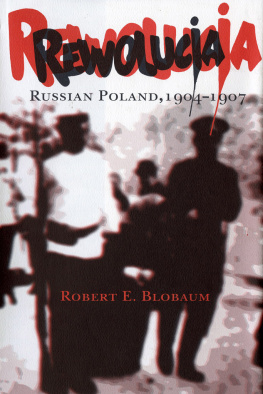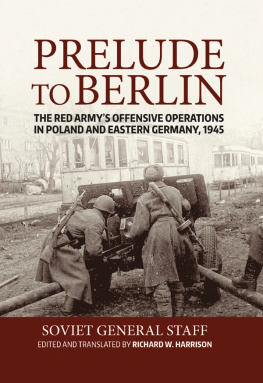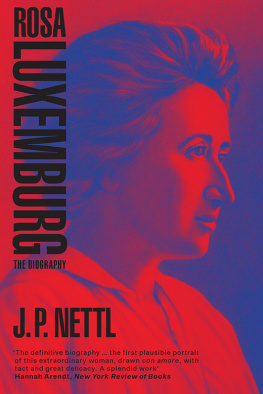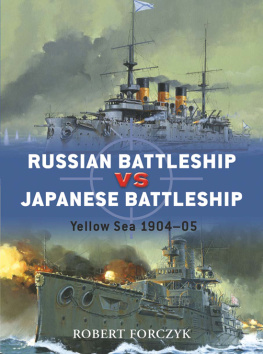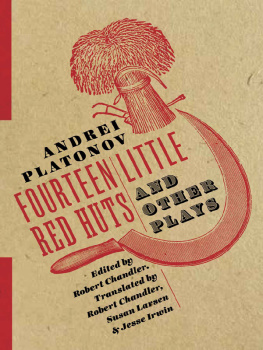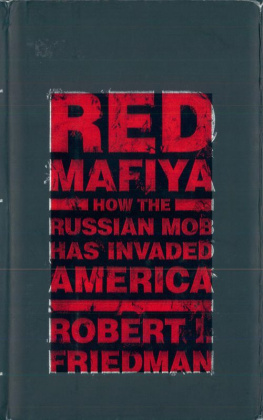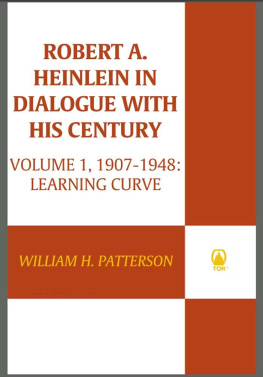Robert E. Blobaum - Rewolucja: Russian Poland, 1904-1907
Here you can read online Robert E. Blobaum - Rewolucja: Russian Poland, 1904-1907 full text of the book (entire story) in english for free. Download pdf and epub, get meaning, cover and reviews about this ebook. year: 1995;2016, publisher: Cornell University Press, genre: Politics. Description of the work, (preface) as well as reviews are available. Best literature library LitArk.com created for fans of good reading and offers a wide selection of genres:
Romance novel
Science fiction
Adventure
Detective
Science
History
Home and family
Prose
Art
Politics
Computer
Non-fiction
Religion
Business
Children
Humor
Choose a favorite category and find really read worthwhile books. Enjoy immersion in the world of imagination, feel the emotions of the characters or learn something new for yourself, make an fascinating discovery.
- Book:Rewolucja: Russian Poland, 1904-1907
- Author:
- Publisher:Cornell University Press
- Genre:
- Year:1995;2016
- Rating:3 / 5
- Favourites:Add to favourites
- Your mark:
- 60
- 1
- 2
- 3
- 4
- 5
Rewolucja: Russian Poland, 1904-1907: summary, description and annotation
We offer to read an annotation, description, summary or preface (depends on what the author of the book "Rewolucja: Russian Poland, 1904-1907" wrote himself). If you haven't found the necessary information about the book — write in the comments, we will try to find it.
Rewolucja: Russian Poland, 1904-1907 — read online for free the complete book (whole text) full work
Below is the text of the book, divided by pages. System saving the place of the last page read, allows you to conveniently read the book "Rewolucja: Russian Poland, 1904-1907" online for free, without having to search again every time where you left off. Put a bookmark, and you can go to the page where you finished reading at any time.
Font size:
Interval:
Bookmark:
Historians of imperial Russia are well acquainted with the problems of dating before the Soviet regimes adoption of the Gregorian, or New Style, calendar, but in the case of the Kingdom of Poland, the matter is even more complex. Exclusive use of the Julian, or Old Style, calendar in Poland was confined mainly to internal correspondence and documents among state agencies. Proclamations to the population and other public documents usually were dated according to both calendars, although on occasion only the New Style date, thirteen days past the Old Style date, appeared. As for the population at large, with its historic ties to the Latin culture of the West, its reliance on the New Style calendar was practically uniform. I have therefore followed social rather than administrative usages, and all dates are rendered in the New Style throughout the narrative. In source citations, however, particularly where an official document was dated according to the Old Style, I maintain the original while providing the New Style version in parentheses.
These same official documents, composed in the Russian language, also posed a dilemma in deciphering Polish surnames and place names. I spent many hours attempting to locate on past and present maps the exact spelling of the Polish name of this or that small village, whose only rendition in the sources was in Russian. Because time and historical atlases are frequently unkind to smaller communities, I was not always successful: I was forced into more than one educated guess. A similar problem cropped up when the only reference to a particular individualfor example, in a police protocolwas in Russian. For the most part, the names were easily rendered back into Polish and the Latin alphabet, thanks to common Slavic consonant clusters, but undoubtedly my retransliterations are not error-free. Jewish names, often poorly transliterated by the Russian authorities, posed an especially difficult chore in this regard, for which I beg the readers indulgence.
Finally, the archival collections cited in this book have changed over time, usually though the accretion of new documents. Entire sygnatury (portfolios of documents known to my colleagues in Russian history as fonds) have been recataloged and renumbered, sometimes more than once, as have the individual documents contained therein. Consequently, most source citations made by researchers in the late 1960s are no longer valid today; and with another archival reorganization currently in progress as entire collections are being relocated, those made today may not be valid tomorrow. Therefore, I have identified the vast majority of these documents more completely than would usually be the case, both as a hedge against further change and as a more precise aid to future research.
Archives and Collections
| ADK | Archiwum Diecezjalne w Kielcach (Diocesan Archive in Kielce) AK: Akta Konsistorskie (Documents of the Consistory) KD: Konferencje Dekanalne (Conferences of the Deaconate) |
| ADP | Archiwum Diecezjalne w Pocku (Diocesan Archive in Pock) PWD: Papiery Wadzy Duchownej (Papers of the Bishop) |
| AGAD | Archiwum Gwne Akt Dawnych (Main Archive of Old Documents) AB: Zbir Anny Branickiej (Anna Branicka Collection) KGGW: Kancelaria Gubernator Generaa Warszawskiego (Chancellory of the Warsaw Governor-General) |
| APK | Archiwum Pastwowe w Kielcach (State Archive in Kielce) TGGK: Tymczasowy Genera Gubernator Kielecki (Provisional Governor-General of Kielce Province) |
| APL | Archiwum Pastwowe w Lublinie (State Archive in Lublin) KGL: Kancelaria Gubernatora Lubelskiego (Chancellory of the Lublin Governor) |
| AP | Archiwum Pastowe w odzi (State Archive in d) KGP: Kancelaria Gubernatora Piotrkowskiego (Chancellory of the Piotrkw Governor) TGGP: Tymczasowy Genera Gubernator Piotrkowski (Provisional Governor-General of Piotrkw Province) |
| APW | Archiwum Pastwowe m. st. Warszawy (State Archive in Warsaw) WGZZ: Warszawski Gubernialny Zarzd andarmerii (Office of the Warsaw Provincial Gendarmes) WWO: Warszawski Wydzia Ochrony Porzdku i Bezpieczestwa Publicznego (Warsaw Office of the Okhrana) ZOW: Zarzd Oberpolicmajstra Warszawskiego (Office of the Warsaw Superintendent of Police) |
| CA PZPR | Centralne Archiwum Polskiej Zjednoczonej Partii Robotniczej (Central Archive of the United Polish Workers Party) |
Abbreviations and Polish Acronyms Employed in the Text and Notes
| CKR | Centralny Komitet Robotniczy (Central Workers Committee of the Polish Socialist Party) |
| Endecja | Acronym for the Stronnictwo Demokratyczno-Narodowe (National Democratic Party) |
| LSDP | Lithuanian Social Democratic Party |
| NKK | Narodowe Koo Kolejarzy (National Circle of Railroad Employees) |
| Pedecja | Acronym for the Zwizek Postpowo-Demokratyczny (Progressive Democratic Union) |
| PPS | Polska Partia Socjalistyczna (Polish Socialist Party) |
| PZL | Polski Zwizek Ludowy (Polish People's Union) |
| SDKPiL | Socjaldemokracja Krlestwa Polskiego i Litwy (Social Democratic Party of the Kingdom of Poland and Lithuania) |
| SDPA | Special Deputy to the Warsaw Governor-General for Police Affairs |
| SRCh | Stowarzyszenie Robotnikw Chrzecijaskich (Association of Christian Workers) |
| TON | Towarzystwo Owiaty Narodowej (Society for National Education) |
| WGG | Warsaw Governor-General |
| Zet | Acronym for the Zwizek Mlodziey Polskiej (Union of Polish Youth) |
CHAPTER ONE
The origins of the Revolution of 1905 in Russian Poland can be traced back to developments in the final phase of an earlier but far different upheaval, the January Insurrection of 18631864. As tsarist Russia suppressed this last of a series of challenges by the Polish nobility, or szlachta, to its hegemony in central Poland, it set in motion forces that were to reshape Polish society and redefine Polish politics for decades to come. The January Insurrection was therefore an authentic historical watershed, the culminating point of the turbulent romantic era of Polish history and the point of departure for a new period, the contours of which would not be clearly visible until some forty years later.
The insurrection that erupted in January 1863 resulted from frustration and disappointment with the limited concessions offered the Kingdom of Poland by Alexander II shortly after he succeeded to the Russian and Polish thrones in 1855. Since the suppression of the November Insurrection of 18301831, the Kingdom had suffered the iron rule of Nicholas I and his viceroy in Warsaw, Gen. Ivan F. Paskevich. The Kingdoms autonomous status within the Russian Empire, supposedly guaranteed by agreements reached at the Congress of Vienna in 1815, had been reduced to a legal fiction. In effect, the country was ruled by military decree for almost a quarter of a century. Then came the disastrous defeats of the Crimean War, also inherited by Alexander from his father, which convinced the new tsar that limited reforms were necessary in Poland to avoid a prospective uprising. Consequently, Alexander issued an amnesty for Poles exiled to Siberia in 1831, reopened institutions of higher learning, and restored the right of assembly to permit participation of the Polish elite in the statewide debate on planned reforms, especially peasant emancipation.
Font size:
Interval:
Bookmark:
Similar books «Rewolucja: Russian Poland, 1904-1907»
Look at similar books to Rewolucja: Russian Poland, 1904-1907. We have selected literature similar in name and meaning in the hope of providing readers with more options to find new, interesting, not yet read works.
Discussion, reviews of the book Rewolucja: Russian Poland, 1904-1907 and just readers' own opinions. Leave your comments, write what you think about the work, its meaning or the main characters. Specify what exactly you liked and what you didn't like, and why you think so.

